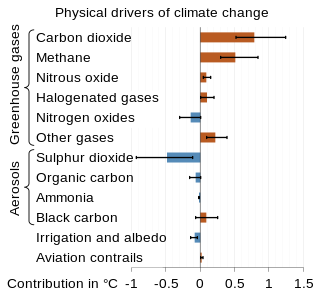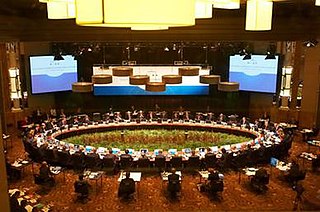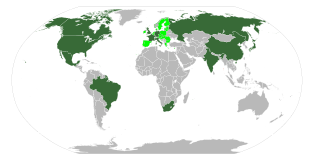Related Research Articles

The scientific community has been investigating the causes of climate change for decades. After thousands of studies, it came to a consensus, where it is "unequivocal that human influence has warmed the atmosphere, ocean and land since pre-industrial times." This consensus is supported by around 200 scientific organizations worldwide, The dominant role in this climate change has been played by the direct emissions of carbon dioxide from the burning of fossil fuels. Indirect CO2 emissions from land use change, and the emissions of methane, nitrous oxide and other greenhouse gases play major supporting roles.

Climate is the long-term weather pattern in a region, typically averaged over 30 years. More rigorously, it is the mean and variability of meteorological variables over a time spanning from months to millions of years. Some of the meteorological variables that are commonly measured are temperature, humidity, atmospheric pressure, wind, and precipitation. In a broader sense, climate is the state of the components of the climate system, including the atmosphere, hydrosphere, cryosphere, lithosphere and biosphere and the interactions between them. The climate of a location is affected by its latitude, longitude, terrain, altitude, land use and nearby water bodies and their currents.

The Kyoto Protocol (Japanese: 京都議定書, Hepburn: Kyōto Giteisho) was an international treaty which extended the 1992 United Nations Framework Convention on Climate Change (UNFCCC) that commits state parties to reduce greenhouse gas emissions, based on the scientific consensus that global warming is occurring and that human-made CO2 emissions are driving it. The Kyoto Protocol was adopted in Kyoto, Japan, on 11 December 1997 and entered into force on 16 February 2005. There were 192 parties (Canada withdrew from the protocol, effective December 2012) to the Protocol in 2020.

Frederick Seitz was an American physicist, tobacco industry lobbyist, and climate change denier. Seitz was the 4th president of Rockefeller University from 1968 to 1978, and the 17th president of the National Academy of Sciences from 1962 to 1969. Seitz was the recipient of the National Medal of Science, NASA's Distinguished Public Service Award, and other honors.

There is a nearly unanimous scientific consensus that the Earth has been consistently warming since the start of the Industrial Revolution, that the rate of recent warming is largely unprecedented, and that this warming is mainly the result of a rapid increase in atmospheric carbon dioxide (CO2) caused by human activities. The human activities causing this warming include fossil fuel combustion, cement production, and land use changes such as deforestation, with a significant supporting role from the other greenhouse gases such as methane and nitrous oxide. This human role in climate change is considered "unequivocal" and "incontrovertible".

The Intertropical Convergence Zone, known by sailors as the doldrums or the calms because of its monotonous windless weather, is the area where the northeast and the southeast trade winds converge. It encircles Earth near the thermal equator though its specific position varies seasonally. When it lies near the geographic Equator, it is called the near-equatorial trough. Where the ITCZ is drawn into and merges with a monsoonal circulation, it is sometimes referred to as a monsoon trough.
The Union of Concerned Scientists (UCS) is a nonprofit science advocacy organization based in the United States. The UCS membership includes many private citizens in addition to professional scientists. Anne Kapuscinski, Professor of Environmental Studies and Director of The Coastal Science and Policy Program at the University of California, Santa Cruz, currently chairs the UCS Board of Directors, having replaced James J. McCarthy, Professor of Biological Oceanography at Harvard University and past president of the American Association for the Advancement of Science in 2015.

The IPCC Third Assessment Report (TAR), Climate Change 2001, is an assessment of available scientific and socio-economic information on climate change by the IPCC. Statements of the IPCC or information from the TAR were often used as a reference showing a scientific consensus on the subject of global warming. The Third Assessment Report (TAR) was completed in 2001 and consists of four reports, three of them from its Working Groups: Working Group I: The Scientific Basis; Working Group II: Impacts, Adaptation and Vulnerability; Working Group III: Mitigation; Synthesis Report. A number of the TAR's conclusions are given quantitative estimates of how probable it is that they are correct, e.g., greater than 66% probability of being correct. These are "Bayesian" probabilities, which are based on an expert assessment of all the available evidence.

Nicholas Herbert Stern, Baron Stern of Brentford, is a British economist, banker, and academic. He is the IG Patel Professor of Economics and Government and Chair of the Grantham Research Institute on Climate Change and the Environment at the London School of Economics (LSE), and 2010 Professor of Collège de France. He was President of the British Academy from 2013 to 2017, and was elected Fellow of the Royal Society in 2014.

Effects of climate change are well documented and growing for Earth's natural environment and human societies. Changes to the climate system include an overall warming trend, changes to precipitation patterns, and more extreme weather. As the climate changes it impacts the natural environment with effects such as more intense forest fires, thawing permafrost, and desertification. These changes impact ecosystems and societies, and can become irreversible once tipping points are crossed.

Aubrey Meyer is an author, violinist, composer and climate campaigner.
Climate Change 2007, the Fourth Assessment Report (AR4) of the United Nations Intergovernmental Panel on Climate Change (IPCC), was published in 2007 and is the fourth in a series of reports intended to assess scientific, technical and socio-economic information concerning climate change, its potential effects, and options for adaptation and mitigation. The report is the largest and most detailed summary of the climate change situation ever undertaken, produced by thousands of authors, editors, and reviewers from dozens of countries, citing over 6,000 peer-reviewed scientific studies. People from over 130 countries contributed to the IPCC Fourth Assessment Report, which took six years to produce. Contributors to AR4 included more than 2,500 scientific expert reviewers, more than 800 contributing authors, and more than 450 lead authors.

Contraction and Convergence (C&C) is a proposed global framework for reducing greenhouse gas emissions to combat climate change. Conceived by the Global Commons Institute (GCI) in the early 1990s, the Contraction and Convergence strategy consists of reducing overall emissions of greenhouse gases to a safe level (contraction), resulting from every country bringing its emissions per capita to a level which is equal for all countries (convergence).

Cap and Share is a regulatory and economic framework for controlling the use of fossil fuels in relation to climate stabilisation. Originally developed by Feasta, the foundation believed that climate change is a global problem and that there is a need to cap and reduce greenhouse gas emissions globally, the philosophy of Cap and Share maintains that the Earth's atmosphere is a fundamental common resource. Consequently, it is argued, each individual should get an equal share of the benefits from the limited amount of fossil fuels that will have to be burned and their emissions released into the atmosphere in the period until the atmospheric concentration of greenhouse gases has been stabilised at a safe level. Given the vast discrepancies in fossil fuel use between the wealthy and poor on a global level, Cap and Share would have a highly progressive economic effect, reducing inequality and helping to support climate justice and the energy transition in the Global South.

The 2006 G20 Meeting of Finance Ministers and Central Bank Governors was held in Melbourne, Australia between 18 and 19 November 2006. Issues discussed included "the outlook for the global economy; developments in resource markets and ways to improve their efficiency; the impact of demographic change on global financial markets; and further reform of the International Monetary Fund and the World Bank."

The Group of Eight + Five (G8+5) was an international group that consisted of the leaders of the heads of government from the G8 nations, plus the heads of government of the five leading emerging economies. In March 2014, Russia was cast out of the Group of 8 due to its involvement in the 2014 Crimea crisis in Ukraine, so the G8+5 in its original form is unlikely to reconvene with Russia present.

The fossil fuels lobby includes paid representatives of corporations involved in the fossil fuel industry, as well as related industries like chemicals, plastics, aviation and other transportation. Because of their wealth and the importance of energy, transport and chemical industries to local, national and international economies, these lobbies have the capacity and money to attempt to have outsized influence on governmental policy. In particular, the lobbies have been known to obstruct policy related to environmental protection, environmental health and climate action.
The International Carbon Reduction and Offset Alliance (ICROA) is an industry trade group for providers of voluntary carbon offsets. It was established in 2008, and aims to promote industry self-regulation based on its ICROA Code of Best Practices. Members produce an annual report demonstrating compliance with the ICROA Code.
The Climatic Research Unit email controversy began in November 2009 with the hacking of a server at the Climatic Research Unit (CRU) at the University of East Anglia (UEA) by an external attacker, copying thousands of emails and computer files to various internet locations several weeks before the Copenhagen Summit on climate change.
The history of climate change policy and politics refers to the continuing history of political actions, policies, trends, controversies and activist efforts as they pertain to the issue of climate change. Climate change emerged as a political issue in the 1970s, where activist and formal efforts were taken to ensure environmental crises were addressed on a global scale. International policy regarding climate change has focused on cooperation and the establishment of international guidelines to address global warming. The United Nations Framework Convention on Climate Change (UNFCCC) is a largely accepted international agreement that has continuously developed to meet new challenges. Domestic policy on climate change has focused on both establishing internal measures to reduce greenhouse gas emissions and incorporating international guidelines into domestic law.
References
- ↑ "House of Commons - Environmental Audit Committee - Written Evidence". Parliament of the United Kingdom. 13 June 2001. Archived from the original on 1 December 2012. Retrieved 2 December 2012.
- ↑ "Global Commons Institute". Archived from the original on 5 May 2007. Retrieved 23 April 2007.
- ↑ "Archived copy" (PDF). Archived from the original (PDF) on 27 September 2011. Retrieved 23 April 2007.
{{cite web}}: CS1 maint: archived copy as title (link) Original statement